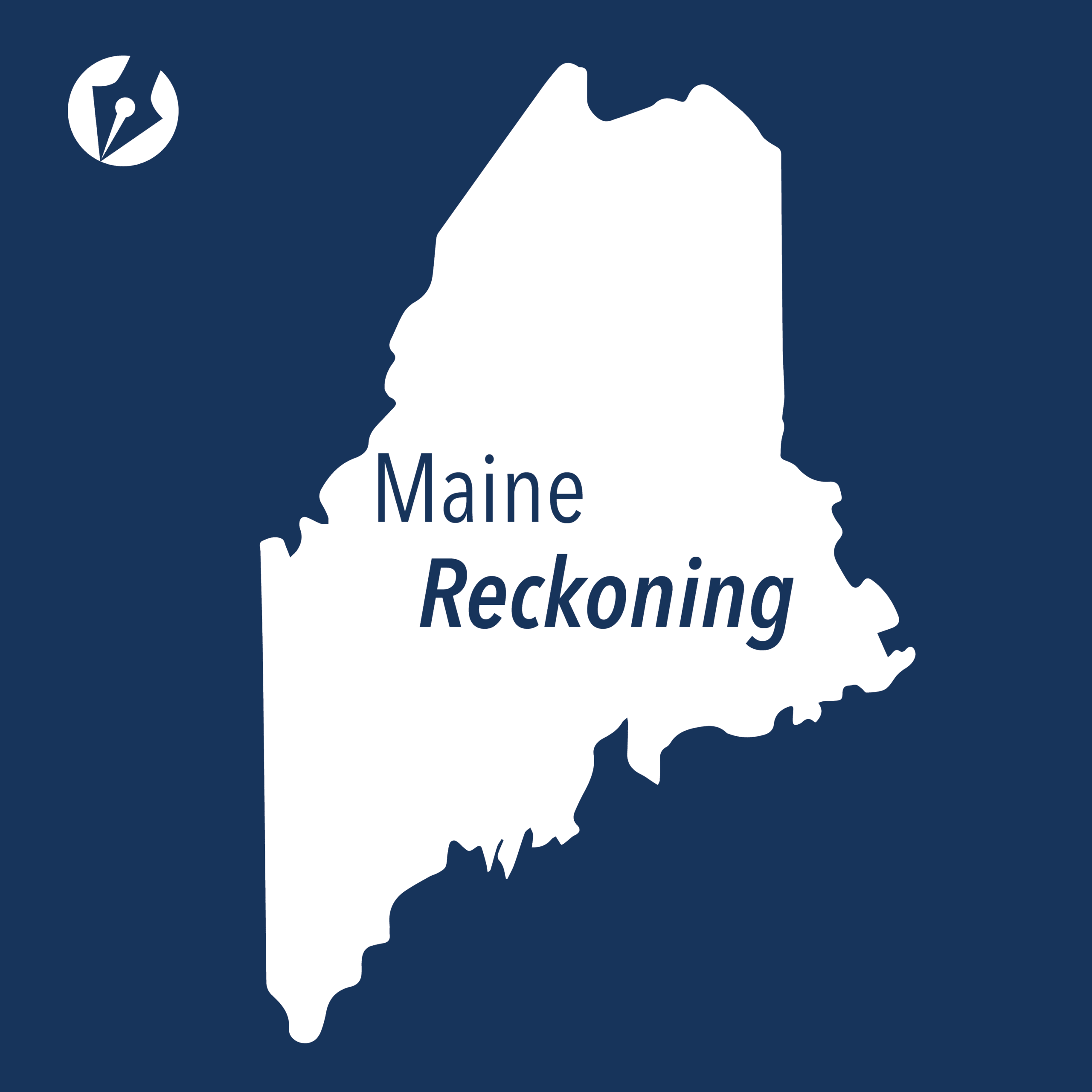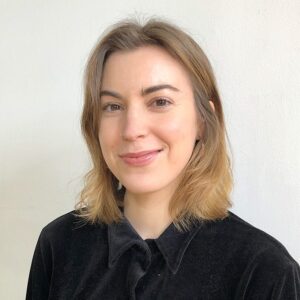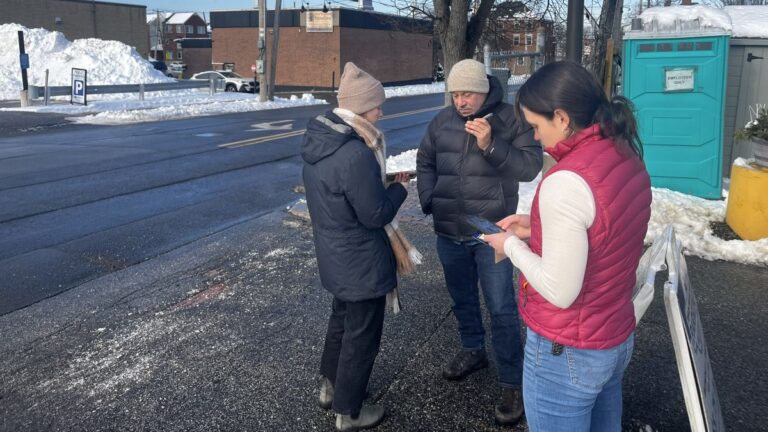Listen to this podcast episode here.
This podcast was produced with the support of the Goldfarb Center for Public Affairs at Colby College and the Elmina B. Sewall Foundation.
I’m Tori Lyn, and you’re listening to Maine Reckoning. In this podcast, I interview Black Mainers about how their lives have changed since the murder of George Floyd nearly two years ago.
In this episode, you’ll hear my conversation with Ruby and Ellis Jenkins-Henry, two students from Portland.
Here’s the episode.
Hello friends. Thank you so much for chatting with me. I would love for both of you to introduce yourself.
RUBY: I’m Ruby and I’m 15 years old and I go to Portland High School as a sophomore there.
ELLIS: I’m Ellis. I’m 12, and I go to King Middle School and the sixth grade.
And when is summer break, are we getting close to the end of the school year?
RUBY: I think someone said it was like five Tuesdays away or something like that, which is like a nice way to think of it.
What are your summer plans? What do we got going on? What are we doing for fun this summer?
ELLIS: I have some basketball camps I’m going to be doing. I play as, like a center, big man, kind of, but I want to be a shooting guard.
RUBY: I actually applied and got into Seeds of Peace camp, this like cool camp that you go to and it’s overnight. And you talk a lot about like social issues and trying to create change in your communities, but like you also do normal camp stuff. I think it’s on a lake. And I dunno, I felt like it was a good thing for me to do, cause like I’m passionate about social justice and I also want to go to a normal camp. So I thought it was cool.
Ruby, I know you talked about, you’re interested in social justice. And I guess I’m curious, when we talk about the word activist that I know is thrown around a lot, especially I think over the last couple of years in Portland, there’s a lot of different ways that people look at themselves as activists. So I guess I’m curious in both of your perspectives, what does the word activist mean to you?
RUBY: I think an activist is just someone who advocated strongly for other people’s needs. It could be like communication with other people or like spreading awareness about certain issues that they’re really passionate.
ELLIS: I think it’s someone who just like takes action in some way to try to make something happen or to do something.
Do both of you identify as activists given how you define it?
ELLIS: I’d say in some circumstances I’m an activist.
RUBY: I would say I’m an activist because I’m in this group called youth leaders and it’s like young people of color, mostly in Portland who address and then talk to people on like the school board and like city council and things like that. We were talking about racial equity in classrooms or in schools, and I think we were also talking about the dress code and how a lot of the times it’s biased towards black women and women of color, or just black students. In general, I brought up certain specifics from my school, like how in our dress code, you couldn’t wear bandanas because it was like gang colors. And then they were only dress coding black and brown students for wearing them because they like assumed they were in a gang. Almost all of my black and brown friends had been like dress coded for what they’re wearing, but not a lot of my white friends, even if they were the same. So I was trying to bring up awareness to bias in that. Yeah. It just felt like now they’re aware of that. So the next time there’s like a debate over that, or there’s an option to try and solve that maybe people will be able to remember that. I would say that was like a moment where I was like really creating change, getting to like the root of what could change something or what could solve something.
Was there something that happened that made you both say like, okay. Yeah, I think I actually do identify as an activist.
RUBY: I think I kind of started my activism with global warming and climate change.
ELLIS: For me, I remember in like late elementary school for me, that’s when the George Floyd incident happen. And I got in the Black Lives Matter group and we like interviewed lots of people and made like posters and charts and stuff. And I’ve been to different protests.
Portland definitely responded to the George Floyd murder with lots of protests. You know, I’m, I’m wondering how you think Portland in itself responded.
RUBY: I feel like it was a mix because obviously we had a lot of protests and like demonstrations. Like I remember going to black lives matter protests, but I feel like there was also a lot of our community that like kind of chose to ignore it and act like it wasn’t happening.
Did they talk about it at school? Did the teacher is say anything about it? And did you have any type of, um, like assembly or meeting on what had happened?
RUBY: I don’t think we had a meeting. I think we kind of heard about it, like personally from teachers, but I don’t think it was really like part of the lesson or like the school day. Really, I feel like certain teachers mentioned it because it was just all over the news and they wanted to like see who knew about it, but it would have been maybe more helpful to have it be part of a class or like have a, so we could’ve discussed it.
ELLIS: For me in elementary school, the end of fourth grade, I think they didn’t really like go and tell the kids what happened. It didn’t get came up sometime. But in sixth grade this year, we talked about it a lot and like how it has impacted people.
Yeah. And what kind of, what kind of conversations were you having with your friends about it? What was the response from the people that you spend the most time with?
RUBY: I was definitely talking a lot about it to like friends and family. It was hard obviously, like talk about it with my family specifically, because Ellis was like pretty young. I didn’t want to like mention the details of it in front of him. And like, my parents didn’t either, because obviously that’s super scary. So I feel like that was kind of difficult, but I talked to my friends about it. I feel like everyone was seeing on social media who’s my age, so we definitely had like, conversations about it on social media and in person.
ELLIS: I mean, I knew what happened vaguely. I didn’t know the details like Ruby said. Some of my friends had opinions on it. They’d be like, “Well, that thing doesn’t really things like that don’t happen in Portland. Like, don’t be worried about that.” But then I wasn’t really sure of that. Cause it just happened. Why wouldn’t happen here? And I was, I was kinda confused, I guess.
I’m wondering, do you think that this is something that can happen in Portland and how do you respond when people say things like, oh, well that was, you know another city, so we don’t need to worry about it here.
RUBY: I think that it could definitely happen in Portland because systemic racism is everywhere in our country. So just because you’re in a different location, doesn’t mean that the people like law enforcement have like different mindsets. So I feel like something like that is possible to happen in Portland, which is definitely, really scary to think about. Another thing is like, it’s so unpredictable to tell when things like this might have. You never really know when it is or like where it would happen. You just know that something like that could happen.
One of the things I noticed for me was my relationship started changing after the murder of George Floyd in a way that I hadn’t seen before the conversations I was having with people, um, took a new weight. And because of that, things were coming up in relationships. I had with people that maybe hadn’t been addressed before. And I. When we talk about racism and we talk about racism between friendships. Sometimes we address it and sometimes we don’t. And I noticed that I was addressing a lot more things than I, what I had addressed prior to George Floyd being murdered. So I guess I’m wondering if you had any experiences where you saw a change in your relationships after the murder?
RUBY: I think I had some changes in my relationships. There was some people that, like, I was friends with that I realized weren’t on like the same… I don’t want to say side, but kind of like opinions as me on like social justice, which was harsh to find out about someone that you trusted a lot and stuff. Even people that like I thought I had known for like a really long time, even just like the way they talked about things or like, oh, did you hear about that? Like thing that happened on the news, you could just tell that it didn’t really like affect them or they didn’t really understand how much it affected me. So it was like kind of hard to see them the same.
ELLIS: After that, we had to have conversations that we didn’t have to have before. And our family was always talking about race and I was really educated on those things, but a lot of families, weren’t some families that I’d be around, didn’t want their kids to know about what happened. So then they would ask me questions. I can’t really answer them. And sometimes they would, they didn’t really know everything that happened. So they had assumptions on what happened and we’re like, well, maybe that person shouldn’t have done this. And then it made me feel kind of uncomfortable in those situations.
It makes it difficult to have that conversation with people when you especially have a different opinion of what happened and all of that is based on race as well. So it gets really challenging when I think about. The two of you and especially the ages that you are now, I think of you as the next generation of individuals that are going to be having discussions about how we talk about race, how we talk about systemic racism and how we really work towards being an anti-racist and inclusive and equitable. So how much work do you think we have to do until we can really say, okay, Portland is a completely anti-racist inclusive city or the United States is a completely inclusive anti-racist place to live. How much work do you think that we have to do before we actually can get there?
RUBY: Uh, a lot of work for sure. I mean, as far as like our whole country, I don’t want to say it’s not possible. But it’s just tough because systemic racism is more than an on the surface thing. So there’s not like a specific way to just like fix it or like make it go away because it’s basically what our country’s like built off of and how it still functions. So I don’t know.
ELLIS: I think it would be a lot of work and knowing that we’re are, we’re not even at the step where everybody can acknowledge it and it’s still kind of debate whether it was a bad thing or a good thing, or. Some people don’t even admit that they happened, but it’s pretty hard for everybody to take action if we don’t even, we aren’t on the same page on what to do.
RUBY: I feel like for our city, we definitely aren’t there yet. My hopes for Portland is that I guess our city becomes a place where people feel more represented in like safer in their communities. And I also hope that like our school system starts educating people more on race and racial bias, not just that, but all different social issues because a lot of that happens in school. So I feel like it makes sense for us to learn about it there.
ELLIS: And I think this year has been doing a lot better. The teachers have, and my social studies class, our teacher has been teaching us a lot about current events and serious things. And I’m really glad because elementary school, I was always called on when topic Black Lives Matter and civil rights came up. And, but now it seems like we can learn it in a place where I don’t feel pressured to be like a teacher.
RUBY: I feel like that’s kind of a tough topic, but a really good thing that you brought up because a lot of times black and brown students are kind of put in positions where they have to like educate their white peers or even the like white teachers. And obviously like, it’s good to like educate people and spread your perspective. But I feel like it shouldn’t be students of colors’ like responsibility to do that. Or like, we shouldn’t feel obligated to do that because we don’t have to like educated people, you know, topics that they’re ignorant about. So I just thought that was really interesting how Ellis brought up that he had to come and do that at a young age. I did, too.
When you think about your future, do you see yourself continuing to be in Maine or do you see yourself in an entirely different place?
I don’t want to like stay in Maine my whole life. I definitely want to like travel and explore. Nothing like, you know, specifically against Maine, but I just don’t want to stay in like one place. Also, I’d rather live somewhere that’s like more diverse because I would probably just feel more comfortable. I don’t want to go to college in Maine. That’s when I’m going to try to move. Then I feel safe most of the time and comfortable in Maine, but I want to live in a more diverse, populated place where I can see people who are like me. Kind of relate to things.
Being Black as hard and being black and Portland is really hard. And so my biggest thing is how do I make sure I’m finding joy every day? What am I doing that is going to boost me up? So what, what is it that you to do to just really bring yourself some joy?
RUBY: I like to run and I do that like competitively for my school. I like art a lot, so I spend a lot of my time drawing and like listening to music, reading, and I just hang out with my friends. Like I go and like have fun downtown and like watch movies and do stuff like that.
ELLIS: I’m a really social person, I think. And I always try to hang out with friends. It doesn’t really matter what I’m doing. I like to be around people that I feel comfortable with.
Who are some of your role models when you think about people that you identify with aspire to be who is on the list?
ELLIS: Ruby’s a role model to me, but I’m not really sure though.
RUBY: Mine would probably be Amanda Gorman. I really liked the way that she channels her activism through writing. I just think that’s like a really good way to get people to really listen to like your message.
I guess I’m curious, what advice would you give to people that are your age or younger that want to get involved and maybe see themselves as activists, but aren’t really sure where to start?
RUBY: I would start by finding something that you’re really passionate about and finding something that you really feel could be improved. And then maybe talking to friends about it, talking to teachers about it, trying. Get like-minded people who also want to like, reach the same goals as you. And then I feel like from there you could like start, I guess, a club at your school. You could just have conversations with people. You could start like fundraisers or like programs. And I feel like that’s a good way to kind of get started.
ELLIS: Yeah. I agree. Like if you want change, if you want something to happen, you have to say something about it. You can’t just expect for it to happen. Like Ruby said, talk to adults, talk to your friends. Try to organize things, be a leader.
Thank you for listening to Maine Reckoning, a podcast from The Maine Monitor. This episode was produced by me, Tori Lyn, and by Carly Peruccio. It was edited by David Dahl. Music is by Blue Dot Sessions. Special thanks to the Goldfarb Center for Public Affairs at Colby College and the Elmina B. Sewall Foundation for their generous support of this podcast. You can visit the Maine Monitor dot org for more independent and citizen-supported journalism. Thanks for listening.









